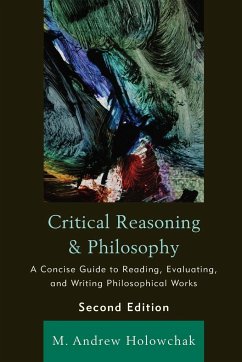M. Andrew Holowchak
Critical Reasoning and Philosophy
A Concise Guide to Reading, Evaluating, and Writing Philosophical Works
M. Andrew Holowchak
Critical Reasoning and Philosophy
A Concise Guide to Reading, Evaluating, and Writing Philosophical Works
- Broschiertes Buch
- Merkliste
- Auf die Merkliste
- Bewerten Bewerten
- Teilen
- Produkt teilen
- Produkterinnerung
- Produkterinnerung
Critical Reasoning and Philosophy is an innovative and clearly written handbook that teaches students how to read critically, think critically while they read, and write thoughtful, sound arguments in response.
Andere Kunden interessierten sich auch für
![Guide to English Proficiency, Logic & Quantitative Reasoning for JIPMER with 7 Past & 10 Practice Papers 3rd Edition Guide to English Proficiency, Logic & Quantitative Reasoning for JIPMER with 7 Past & 10 Practice Papers 3rd Edition]() Disha ExpertsGuide to English Proficiency, Logic & Quantitative Reasoning for JIPMER with 7 Past & 10 Practice Papers 3rd Edition20,99 €
Disha ExpertsGuide to English Proficiency, Logic & Quantitative Reasoning for JIPMER with 7 Past & 10 Practice Papers 3rd Edition20,99 €![Sketchnoting in School Sketchnoting in School]() Karin PerrySketchnoting in School43,99 €
Karin PerrySketchnoting in School43,99 €![How Parents Can Help Kids Improve Test Scores How Parents Can Help Kids Improve Test Scores]() Steven SchneiderHow Parents Can Help Kids Improve Test Scores113,99 €
Steven SchneiderHow Parents Can Help Kids Improve Test Scores113,99 €![How Parents Can Help Kids Improve Test Scores How Parents Can Help Kids Improve Test Scores]() Steven SchneiderHow Parents Can Help Kids Improve Test Scores62,99 €
Steven SchneiderHow Parents Can Help Kids Improve Test Scores62,99 €![Errorless NCERT Solutions with with 100% Reasoning for Class 12 Biology Errorless NCERT Solutions with with 100% Reasoning for Class 12 Biology]() Disha ExpertsErrorless NCERT Solutions with with 100% Reasoning for Class 12 Biology20,99 €
Disha ExpertsErrorless NCERT Solutions with with 100% Reasoning for Class 12 Biology20,99 €![Planning a Successful Conference Planning a Successful Conference]() Cynthia WinterPlanning a Successful Conference101,99 €
Cynthia WinterPlanning a Successful Conference101,99 €![Finding an Academic Job Finding an Academic Job]() Karen M. Sowers-HoagFinding an Academic Job101,99 €
Karen M. Sowers-HoagFinding an Academic Job101,99 €-
-
-
Critical Reasoning and Philosophy is an innovative and clearly written handbook that teaches students how to read critically, think critically while they read, and write thoughtful, sound arguments in response.
Hinweis: Dieser Artikel kann nur an eine deutsche Lieferadresse ausgeliefert werden.
Hinweis: Dieser Artikel kann nur an eine deutsche Lieferadresse ausgeliefert werden.
Produktdetails
- Produktdetails
- Verlag: Rowman & Littlefield Publishers
- 2nd Edition
- Seitenzahl: 168
- Erscheinungstermin: 22. August 2011
- Englisch
- Abmessung: 229mm x 152mm x 9mm
- Gewicht: 254g
- ISBN-13: 9781442205222
- ISBN-10: 1442205229
- Artikelnr.: 33806341
- Herstellerkennzeichnung
- Libri GmbH
- Europaallee 1
- 36244 Bad Hersfeld
- gpsr@libri.de
- Verlag: Rowman & Littlefield Publishers
- 2nd Edition
- Seitenzahl: 168
- Erscheinungstermin: 22. August 2011
- Englisch
- Abmessung: 229mm x 152mm x 9mm
- Gewicht: 254g
- ISBN-13: 9781442205222
- ISBN-10: 1442205229
- Artikelnr.: 33806341
- Herstellerkennzeichnung
- Libri GmbH
- Europaallee 1
- 36244 Bad Hersfeld
- gpsr@libri.de
M. Andrew Holowchak, Ph.D. is a professor of philosophy and history, and editor of 'The Journal of Thomas Jefferson's Life and Times.' He is author/editor of over 65 books and over 270 published essays on topics such as ethics, ancient philosophy, science, psychoanalysis, and critical thinking. His current research is on Thomas Jefferson-he is acknowledged by many scholars to be the world's foremost authority on the thinking of Jefferson-and has published 27 books and over 200 essays on Jefferson. Like Jefferson, he has a passion for "putting up and pulling down," but his putting up and pulling down is not architectural, but done on a landscape or in a garden. He also enjoys lifting weights, bike riding, conferencing, and talking about Thomas Jefferson.
Preface Acknowledgements Part I: Introductory Concerns Module 1: What is
Philosophy? Module 2: Philosophy & Critical Reasoning Part II: Reading
Philosophy Module 3: General Form of a Philosophical Work Module 4: Four
Helpful Steps Part III: Evaluating Philosophy Section A: Argument
Recognition & Reconstruction Module 5: Elements of Argument Recognition
Module 6: Standard Argument Form Section B: Argument Evaluation Module 7:
Setting the Logical Boundaries Module 8: Conditions of Acceptance &
Rejection Module 9: Three Common Deductive Arguments Module 10: Common
Inductive Arguments Module 11: Common Fallacies Section C: Reconstruction
through Diagramming Module 12: Fundamentals of Diagramming Module 13: 10
Diagrammatical Tips Part IV: Writing Philosophy Section A: Preliminaries
for Philosophical Essays Module 14: 13 General Tips for Writing Module 15:
Tips of Avoidance Module 16: Common Mistakes Section B: Writing
Philosophical Essays Module 17: Preparing an Outline Module 18: Writing a
Philosophical Thesis Module 19: Simple Critical Essay Module 20: Synthetic
Critical Essay Section C: Revising & Rewriting Philosophical Essays Module
21: Motivating a Rewrite Module 22: Suggestions for Revising and Rewriting
Essays Appendices Appendix A: Some Exercises for Diagramming Appendix B:
Teacher/Student Comment Sheet Appendix C: Plan-for-Revision Sheet List of
Sources Cited
Philosophy? Module 2: Philosophy & Critical Reasoning Part II: Reading
Philosophy Module 3: General Form of a Philosophical Work Module 4: Four
Helpful Steps Part III: Evaluating Philosophy Section A: Argument
Recognition & Reconstruction Module 5: Elements of Argument Recognition
Module 6: Standard Argument Form Section B: Argument Evaluation Module 7:
Setting the Logical Boundaries Module 8: Conditions of Acceptance &
Rejection Module 9: Three Common Deductive Arguments Module 10: Common
Inductive Arguments Module 11: Common Fallacies Section C: Reconstruction
through Diagramming Module 12: Fundamentals of Diagramming Module 13: 10
Diagrammatical Tips Part IV: Writing Philosophy Section A: Preliminaries
for Philosophical Essays Module 14: 13 General Tips for Writing Module 15:
Tips of Avoidance Module 16: Common Mistakes Section B: Writing
Philosophical Essays Module 17: Preparing an Outline Module 18: Writing a
Philosophical Thesis Module 19: Simple Critical Essay Module 20: Synthetic
Critical Essay Section C: Revising & Rewriting Philosophical Essays Module
21: Motivating a Rewrite Module 22: Suggestions for Revising and Rewriting
Essays Appendices Appendix A: Some Exercises for Diagramming Appendix B:
Teacher/Student Comment Sheet Appendix C: Plan-for-Revision Sheet List of
Sources Cited
Preface Acknowledgements Part I: Introductory Concerns Module 1: What is
Philosophy? Module 2: Philosophy & Critical Reasoning Part II: Reading
Philosophy Module 3: General Form of a Philosophical Work Module 4: Four
Helpful Steps Part III: Evaluating Philosophy Section A: Argument
Recognition & Reconstruction Module 5: Elements of Argument Recognition
Module 6: Standard Argument Form Section B: Argument Evaluation Module 7:
Setting the Logical Boundaries Module 8: Conditions of Acceptance &
Rejection Module 9: Three Common Deductive Arguments Module 10: Common
Inductive Arguments Module 11: Common Fallacies Section C: Reconstruction
through Diagramming Module 12: Fundamentals of Diagramming Module 13: 10
Diagrammatical Tips Part IV: Writing Philosophy Section A: Preliminaries
for Philosophical Essays Module 14: 13 General Tips for Writing Module 15:
Tips of Avoidance Module 16: Common Mistakes Section B: Writing
Philosophical Essays Module 17: Preparing an Outline Module 18: Writing a
Philosophical Thesis Module 19: Simple Critical Essay Module 20: Synthetic
Critical Essay Section C: Revising & Rewriting Philosophical Essays Module
21: Motivating a Rewrite Module 22: Suggestions for Revising and Rewriting
Essays Appendices Appendix A: Some Exercises for Diagramming Appendix B:
Teacher/Student Comment Sheet Appendix C: Plan-for-Revision Sheet List of
Sources Cited
Philosophy? Module 2: Philosophy & Critical Reasoning Part II: Reading
Philosophy Module 3: General Form of a Philosophical Work Module 4: Four
Helpful Steps Part III: Evaluating Philosophy Section A: Argument
Recognition & Reconstruction Module 5: Elements of Argument Recognition
Module 6: Standard Argument Form Section B: Argument Evaluation Module 7:
Setting the Logical Boundaries Module 8: Conditions of Acceptance &
Rejection Module 9: Three Common Deductive Arguments Module 10: Common
Inductive Arguments Module 11: Common Fallacies Section C: Reconstruction
through Diagramming Module 12: Fundamentals of Diagramming Module 13: 10
Diagrammatical Tips Part IV: Writing Philosophy Section A: Preliminaries
for Philosophical Essays Module 14: 13 General Tips for Writing Module 15:
Tips of Avoidance Module 16: Common Mistakes Section B: Writing
Philosophical Essays Module 17: Preparing an Outline Module 18: Writing a
Philosophical Thesis Module 19: Simple Critical Essay Module 20: Synthetic
Critical Essay Section C: Revising & Rewriting Philosophical Essays Module
21: Motivating a Rewrite Module 22: Suggestions for Revising and Rewriting
Essays Appendices Appendix A: Some Exercises for Diagramming Appendix B:
Teacher/Student Comment Sheet Appendix C: Plan-for-Revision Sheet List of
Sources Cited








